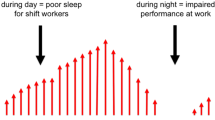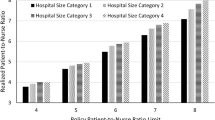Abstract
Background and Aims
There is a paucity of research on the use of the electronic health record (EHR) by gastroenterology and hepatology providers and its effect on work–life balance. Our aim was to study the after-hour EHR work completed among providers within a multispecialty academic practice.
Methods
Time spent completing EHR tasks during evening hours (7p-7a) and days off was prospectively recorded for 35 providers over six consecutive months at a single center. Type and time of EHR tasks completed were compared based on subspecialty, academic degree, academic track category, identified gender, and number of weekly assigned clinical days worked. Prior to the data collection, providers filled out a survey regarding EHR use, work hours, and work–life balance.
Results
All providers used EHR during evening hours and during days off. The total mean after-hours time spent completing EHR tasks was 18.4 m (± 13.0) per day and 45.0 m (± 25.8) during days off. There was significant variation in the daily mean after-hours time spent completing EHR tasks among subspecialties, range 45.3 m (± 27.1) (advanced endoscopy)-28.7 m (± 22.7) (hepatology), and among providers who work clinically > 7.5 days per week versus those who do not, 42.1 m (± 25.7) vs 30.0 m (± 14.0). The most common after-hours EHR task was note completion. 83% providers reported being unable to complete EHR tasks during allotted workday time and 87% report that EHR tasks interfered with family life; 74% with social life.
Conclusion
Gastroenterology and hepatology providers spend a significant amount of after-hour time completing EHR tasks which is perceived to interfere with family/social life.


Similar content being viewed by others
References
Henry J, Pylypchuk Y, Searcy T, et al. Adoption of Electronic Health Record Systems among U.S. Non-Federal Acute Care Hospitals: 2008–2015. ONC Data Brief 35; 2016.
Shanafelt TD, Boone S, Tan L et al. Burnout and satisfaction with work-life balance among US physicians relative to the general US population. Arch Intern Med. 2012;172:1322–1385.
Friedberg MW, Chen PG, Van Busum KR et al. Factors affecting physician professional satisfaction and their implications for patient care, health systems, and health policy. Rand Health Q. 2014;3:1.
Shanafelt TD, Hasan O, Dyrbye LN et al. Changes in burnout and satisfaction with work-life balance in physicians and the general UW working population between 2011 and 2014. Mayo Clin Proc. 2015;90:1600–1613.
West CP, Dyrbye LN, Shanafelt TD. Physician burnout: contributors, consequences and solutions. J Intern Med. 2018;283:516–529.
Shanafelt TD, Balch CM, Bechamps G et al. Burnout and medical errors among American surgeons. Ann Surg 2010;251:995–1000.
Williams ES, Manwell LB, Konrad TR et al. The relationship of organizational culture, stress, satisfaction, and burnout with physician-reported error and suboptimal patient care: results from the MEMO study. Health Care Manage Rev 2007;32:203–212.
Salyers MP, Bonfils KA, Luther L et al. The relationship between professional burnout and quality and safety in healthcare: a meta-analysis. J Gen Intern Med 2017;32:475–482.
McCain RS, McKinley N, Dempster M et al. A study of the relationship between resilience, burnout and coping strategies in doctors. Postgrad Med J 2018;94:43–47.
Chen KY, Yang CM, Lien CH et al. Burnout, job satisfaction, and medical malpractice among physicians. Int J Med Sci 2013;10:1471–1478.
Linzer M, Visser MR, Oort FJ et al. Predicting and preventing physician burnout: results from the United States and the Netherlands. Am J Med 2001;111:170–175.
Allegra CJ, Hall R, Yothers G, Prevalence of burnout in the U.S. oncology community: results of a,. survey. J Oncol Pharm Pract/Am Soc Clin Oncol 2003;2005:140–147.
Melnick E, Dyrbye L, Sinsky C et al. The Association Between Perceived Electronic Health Record Usability and Professional Burnout Among US Physicians. Mayo Clin Proc. 2020;95:476–487.
Shanafelt TD, Dyrbye LN, Sinsky C et al. Relationship between clerical burden and characteristics of the electronic environment with physician burnout and professional satisfaction. Mayo Clin Proc 2016;91:836–848.
Sinsky C, Colligan L, Li L et al. Allocation of Physician Time in Ambulatory Practice: A Time and Motion Study in 4 Specialties. Ann Intern Med. 2016;165:753–760.
Shanafelt TD, West CP, Sloan JA et al. Career fit and burnout among academic faculty. Arch Intern Med 2009;169:990–995.
Ramrakhiani N, Morikawa C, Shetler K. Gastroenterology Providers Spend an Additional 45–50 Minutes of Electronic Health Records Per Hour of Scheduled Time. Clin Gastroenterol Hepatol. 2021;19:1489–1490.
Arndt BG, Beasley JW, Watkinson MD et al. Tethered to the EHR: Primary Care Physician Workload Assessment Using EHR Event Log Data and Time-Motion Observations. Ann Fam Med. 2017;15:419–426.
Gardner RL, Cooper E, Haskell J et al. Physician stress and burnout: the impact of health information technology. J Am Med Inform Assoc. 2019;26:106–114.
Baier RR, Gardner RL, Buechner JS et al. Creating a survey to assess physicians’ adoption of health information technology. Med Care Res Rev 2012;69:231–234.
Linzer M, Poplau S, Babbott S et al. Worklife and wellness in academic general internal medicine: results from a national survey. J Gen Intern Med 2016;31:1004–1010.
Redd TK, Doberne JW, Lattin D, et al. Variability in Electronic Health Record Usage and Perceptions among Specialty vs. Primary Care Physicians. AMIA Annu Symp Proc. 2015 Nov 5;2015:2053–62.
Kuhn CM, Flanagan EM. Self-care as a professional imperative: physician burnout, depression, and suicide. Can J Anaesth. 2017;64:158–168.
Hilliard RW, Haskell J, Gardner RL. Are specific elements of electronic health record use associated with clinician burnout more than others? J Am Med Inform Assoc. 2020;27:1401–1410.
Wallace JE, Lemaire JB, Ghali WA. Physician wellness: a missing quality indicator. Lancet 2009;374:1714–1721.
Martel ML, Imdieke BH, Holm KM et al. Developing a medical scribe program at an academic hospital: the Hennepin County Medical Center Experience. Jt Comm J Qual Patient Saf 2018;44:238–249.
Bank AJ, Obetz C, Konrardy A et al. Impact of scribes on patient interaction, productivity, and revenue in a cardiology clinic: a prospective study. Clinicoecon Outcomes Res 2013;5:399–406.
Koshy S, Feustel PJ, Hong M, Kogan BA. Scribes in an ambulatory urology practice: patient and physician satisfaction. J Urology 2010;184:258–262.
Hopkins K, Sinsky CA. Team-based care: saving time and improving efficiency. Fam Pract Manag. 2014 Nov-Dec;21:23–9
Shanafelt TD, Noseworthy JH. Executive leadership and physician wellbeing: nine organizational strategies to promote engagement and reduce burnout. Mayo Clin Proc 2017;92:129–146.
Krist AH, Beasley JW, Crosson JC et al. Electronic health record functionality needed to better support primary care. J Am Med Inform Assoc 2014;21:764–767.
Collier R. Rethinking EHR interfaces to reduce click fatigue and physician burnout. CMAJ. 2018;190:E994–E995.
Marmor RA, Clay B, Millen M et al. The Impact of Physician EHR Usage on Patient Satisfaction. Appl Clin Inform. 2018;9:11–14.
Downing NL, Bates DW, Longhurst CA. Physician Burnout in the Electronic Health Record Era: Are We Ignoring the Real Cause? Ann Intern Med. 2018;169:50–51.
Funding
None.
Author information
Authors and Affiliations
Corresponding author
Ethics declarations
Conflict of interest
All authors have no conflict of interest to disclose.
Additional information
Publisher's Note
Springer Nature remains neutral with regard to jurisdictional claims in published maps and institutional affiliations.
Rights and permissions
Springer Nature or its licensor holds exclusive rights to this article under a publishing agreement with the author(s) or other rightsholder(s); author self-archiving of the accepted manuscript version of this article is solely governed by the terms of such publishing agreement and applicable law.
About this article
Cite this article
Benson, M., Gopal, D. & Pfau, P. Electronic Health Record Work Demands for Gastroenterology and Hepatology Providers: A Prospective Use Analysis and Survey Study. Dig Dis Sci 68, 1218–1225 (2023). https://doi.org/10.1007/s10620-022-07691-6
Received:
Accepted:
Published:
Issue Date:
DOI: https://doi.org/10.1007/s10620-022-07691-6




